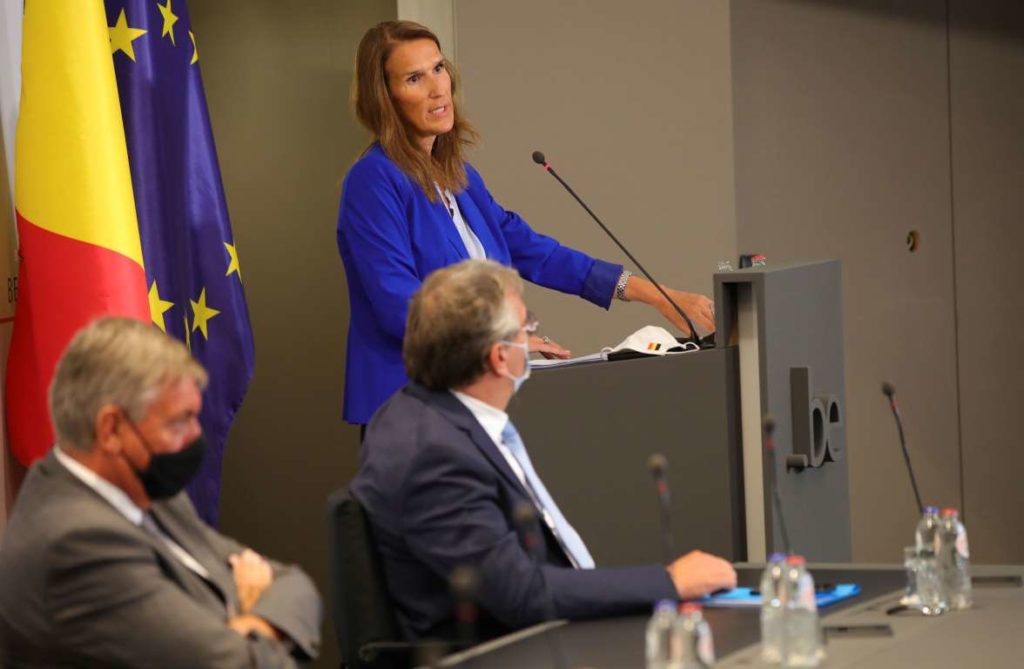Belgium has again adapted the measures in place to curb the spread of the coronavirus in the country, announced Prime Minister Sophie Wilmès during a press conference on Wednesday.
"We had already announced at the last press conference that we would be looking for a long-term strategy," said Wilmès, adding that, in order to understand this crisis properly, it needs to be broken down into three phases.
During the first period, the emphasis was on containing the virus to ensure that healthcare was not overwhelmed, and during the second phase, a gradual phasing out of the measures started.
"That brings us to this third phase: risk management," said Wilmès. "In this way, we are trying to return to a situation that is as normal as possible, in the long term, for which a system can be worked out together with the experts from Celeval."
The 6 golden rules remain a key point, and Wilmès stressed the importance of sticking to them at all times.
Limiting social contacts will be done with a "modular approach," meaning that the rules may change depending on the epidemiological situation.
Instead of the social bubble, there will be a "reference number" that will vary between 1 and 5, depending on the health situation. At the moment, experts recommend a maximum of 5 close contacts per person per month.
"The rule concerning social contacts is especially important. Close contact means being physically close to someone who does not live under the same roof, for more than 15 minutes, without keeping a distance and without a facemask," she said.
Apart from those close contacts, people can see as many people as they want, as long as they keep their distance and respect the hygiene rules. However, meeting more than ten people at a time is still not allowed.
Related News
- Belgium becomes red on European coronavirus map
- Over 500 Covid-19 patients in hospital for the first time since June
- How Belgium lifting its travel ban for red zones impacts travellers
From 1 October, face masks will only be mandatory in crowded places, as well as on public transport and in cinemas, for example. "It is useless to make masks compulsory anytime, anywhere," Wilmès said, calling on local authorities to comply with the change, and not keep the rule in unnecessary places.
For gatherings, a difference is made between private and professional gatherings. For private gatherings, the maximum number of guests remains at 10. "This also applies to gatherings in the streets."
Professionally organised events will follow the same rules as the hospitality industry. There will be no limit on the maximum number of guests allowed, as it will depend on the capacity of the place. The protocols must still be followed, and dance parties are still not allowed.
For events with an audience, however, the limit remains on 200 people for indoor events, and 400 for outdoor ones.
The authorities are working on an "epidemic barometer" at a national, provincial and regional level, to make sure that everyone understands the course of the epidemic better. The levels will be determined mainly - but not exclusively - by the number of people admitted to hospital.
The mandatory quarantine period will be reduced from 14 days to one week. People who show Covid-19 symptoms still have to contact their doctor. On day 5 of the quarantine, a new test can be taken. If negative, people may leave quarantine after the week is up. If positive, the quarantine will be extended to the full 2 weeks.
People returning from orange travel zones will no longer be tested. People returning from a red zone will have to go in quarantine on the first day of their return, and be tested on day 5.
The Coronalert smartphone app will be launched on 30 September, when more information on the subject will be given.
"Do not fall into the trap of nonchalance. We have to find a way to make the six golden rules our own rules. Tackling the epidemic also depends on our behaviour. We are all part of the solution," said Wilmès. "As always, take care of yourself, and take care of each other."
Maïthé Chini
The Brussels Times

